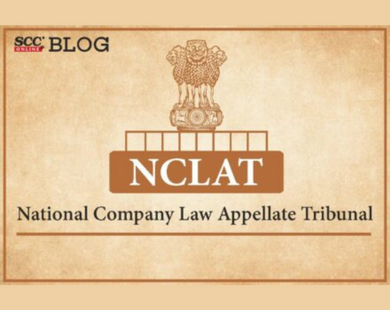National Company Law Appellate Tribunal | While dealing with an appeal challenging the impugned order passed by NCLT, Anant Bijay Singh, J. and Shreesha Merla* (Technical Member), held that the promoters cannot withhold information and necessary documents from the Liquidator as the lookback period is not applicable qua the liquidator.
Factual Matrix
In the instant matter, an appeal was preferred by the appellant, Amardeep Singh Bhatia challenging the impugned order dated 29-05-2020 passed by the Adjudicating Authority, NCLT where the Liquidator was permitted to investigate the transactions executed by the Corporate Debtor beyond 2 years from the insolvency commencement date, while exercising the inherent powers under R. 11 of the NCLT Rules. The Adjudicating Authority went on to cite S. 19 of the Insolvency and Bankruptcy Code, 2016 (IBC) while stating that the promoters and other associated persons shall provide all assistance to the interim resolution professionals and directed the members of suspended management to handover all the relevant documents and information and cooperate with the Liquidator. The order stated that:
“…exercising the inherent powers under Rule 11 of NCLT Rules, the Liquidator is hereby permitted to scrutinize /investigate the transactions executed/entered by the Corporate Debtor beyond 2 years from the insolvency commencement date i.e. from 01.04.2008 as required by the Forensic Auditor M/s. KPMG. The relevant information/documents/records are required to be sought by the Liquidator from the Directors/Suspended Board and other Personnel of the Corporate Debtor in relation to those transactions which have been entered into /executed by the Corporate Debtor from 01.04.2008.”
Appellant’s Contention
The appellant contended that as per S. 43 IBC, a ‘Related Party’ shall be given preference during the period of two years and parties other than that for one year preceding the Insolvency Commencement Date (‘ICD’).
The appellant relied upon Anuj Jain v. Axis Bank Ltd., (2020) 8 SCC 401 for the argument. As per the contention of the appellant, the Corporate Debtor under S. 19 IBC cannot be expected to cooperate and provide documents since the Liquidator cannot investigate a ‘Corporate Debtor’ beyond two years from the ICD. It was also argued that as per S. 35(1)(1) IBC, “the Liquidator can investigate the Financial Affairs of the ‘Corporate Debtor’ to determine ‘Undervalued’ or ‘Preferential Transactions’ which having a lookback period of two years prior to the ICD.”
Respondent’s Contention
The respondent/Liquidator contended that if the Liquidator on an examination of the transactions of the corporate debtor as per S. 43(2) IBC determines that certain undervalued transactions were made during the relevant period under S. 46, he shall make an application to the Adjudicating Authority to declare such transactions as void and reverse the effect of such transaction and for such examination the Liquidator is expected to have all the relevant documents.
The respondent further contended that that there is no look back period of two years for S. 66 IBC and if the Liquidator is to file an application under S. 66(2) regarding the fraud committed by the ‘Corporate Debtor’ before the Adjudicating Authority it is presupposed that all the relevant documents are possessed at that time. The Respondent also referred to Regulation 9 of the Insolvency and Bankruptcy Board of India (Liquidation Process) Regulations, 2016, which has no look-back period, and it states that the personnel shall extend cooperation to the Liquidator.
Tribunal’s Observation
The Tribunal observed that unless the Liquidator is in the possession of all the material documents, “he cannot determine whether they are ‘Undervalued Transactions’ or ‘Preferential Transactions’, during the relevant period of time, and therefore, the ‘Corporate Debtor’ cannot deny these documents at the threshold itself.”
The Tribunal observed that there is look-back period specified in S. 66 IBC. The Tribunal outrightly noted that the appellant cannot invoke Regulation 9 solely on grounds of denying the documents.
The Tribunal further observed the reliance on Anuj Jain v. Axis Bank Ltd., (2020) 8 SCC 401 is misplaced as the Adjudicating Authority in that case had already passed an Order that certain transactions were ‘Preferential’/‘Undervalued’.
Tribunal’s Decision
Upholding the order of the Adjudicating Authority having exercised its inherent powers under R.11 of NCLT Rules, 2016, the Tribunal held that it is imperative that the Liquidator is in possession of the relevant documents to determine whether the transaction also falls under Ss. 43 or 46 IBC or a fraud has been committed under S. 66 IBC.
[Amardeep Singh Bhatia v. Abhishek Nagori, 2022 SCC OnLine NCLAT 1579, decided on 28-11-2022]
Advocates who appeared in this case:
Mr. Arvind Kr. Gupta, Ms. Henna George and Ms. Shivani Sharma, Counsel for the Appellant;
Mr. Ratnanko Banerjee (Sr. Advocate), Mr. Arvind Kumar Gupta, Mr. Aditya Krishnamurthy and Mr. Ashutosh Tiwari, Counsel for the Respondents/Intervenor.
*Ritu Singh, Editorial Assistant has put this report together.







